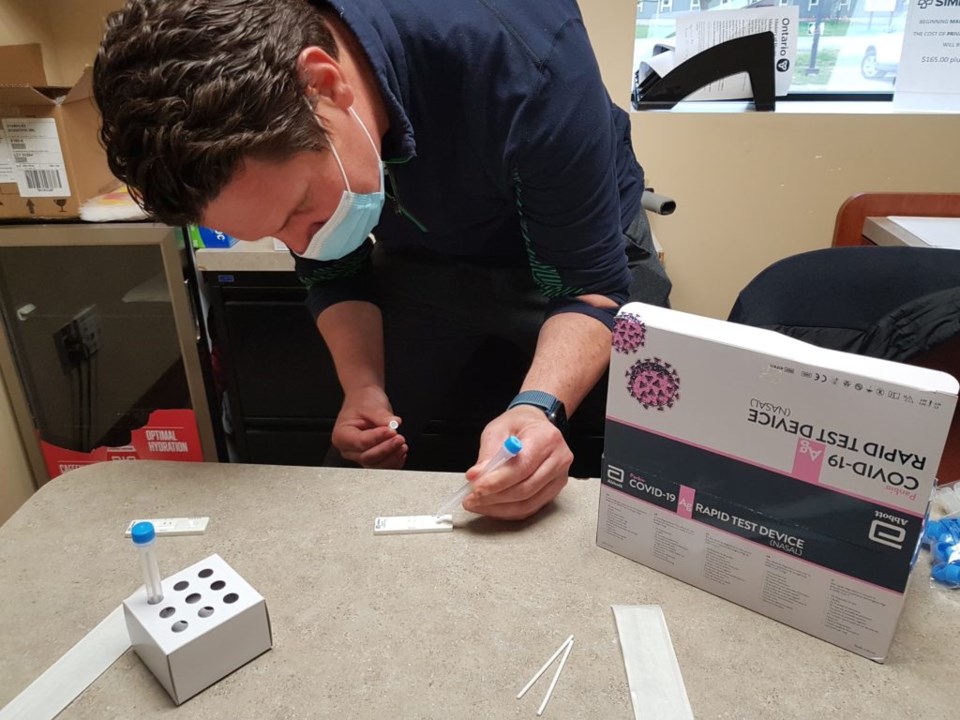
COVID testing for people with no symptoms and no close contact with a known case has been available at pharmacies for months, but access to a rapid antigen test, with results in 15 minutes, has only recently become available locally.
Under the same conditions — if you are asymptomatic and have had no contact with anyone who has tested positive — you can make an appointment at Simpson’s Pharmacy. After an easy swab — not the painful one that feels like it’s reaching your brain, but a quick “shallow” nasal swirl that could be best described as tickling — you can walk out with the reassurance of having tested negative.
Sean Simpson has been offering the more invasive PCR COVID-19 testing, free for asymptomatic individuals that meet specific criteria established by the province, for months. That includes a long list of people, including caregivers, school teachers, staff and students, farm workers, staff of long-term care and retirement homes, and visitors to those homes who require documentation before visiting.
It’s the same test that is being administered at Public Health locations, and is sent to a provincial lab, with results typically taking a day or two, says Simpson.
It is also available to those who are asymptomatic but not on the list of those who are eligible, at a cost of $160, but the rapid antigen test, costing only $30, now provides another option for screening.
It’s being used at some long-term care homes, for staff and residents, providing quick results that allow for better control of infection spread.
Simpson describes it as “a less unpleasant” nose tickler, rather than the deep-nostril PCR test, which he calls a “brain scrape.”
But it’s taken the province a long time to make the rapid test available to pharmacies. More than 3.8 million rapid tests for COVID-19 were distributed by the federal government to the provinces last November, but a large number remained in storage while some provincial governments decided how best to distribute them.
Simpson says some other provinces quickly put them to use, and there was no reason he couldn’t have been offering it months ago to help reduce the spread of infection, especially in workplaces, had the Ontario government moved quickly to distribute them.
Although Simpson says he’s been doing about 30 PCR tests a day, the rapid test is still fairly new, and until this week, he’d done only a handful. On Monday he was beginning workplace screening. As an example of where it can be useful, he cites a construction company with workers who travel to the job site together and work together. Negative test results would ensure the safety of the workers, he says, and could be used effectively for many essential workers, such as electricians or maintenance workers entering a workplace or congregate living space.
A positive test would require a second confirmation PCR test with public health, resulting in quarantining and contact tracing, and could reduce the spread of workplace infections.
Although the province said last week it would be making the rapid test more available for workplaces, it isn’t offered yet at many pharmacies, says Simpson. Earlier this week, as far as he knew, it was only offered at Simpson’s Pharmacy on Niagara Stone Road, Simpson’s Apothecary on King Street and Morrison Pharmasave in Niagara Falls.
“It just more or less became available to the public,” says Simpson.
“The government had a stockpile, and began making them available to long-term care and retirement homes, and a few other places.”
He’d like to be able to distribute the rapid test to workplaces and other group settings, but at the moment, he is only permitted to administer it himself or have a trained staff member do it.
While the PCR is the “gold standard” of testing, considered 99.9 per cent accurate, says Simpson, the rapid test has only about one per cent more false negatives or positives.
Of all he’s provided, many PCRs and a much fewer number of rapid tests, by early this week, he’d only had three positives. But given that it’s for those who are asymptomatic, “we don’t expect a positive test,” he says.
With both options, the local public health unit is notified of a positive test, and also with both, documentation can be provided if it’s needed.
He envisions a move to distribution of rapid tests for regular screenings as more workplaces open up, helping to keep workers safe until they’re vaccinated.
“This would just provide them some measure of safety.”
Workplaces, including long-term care and retirement homes, have different regulations, with some people being tested as often as four times a week. Some alternate the PCR test with rapid testing, he says.
“Things change minute to minute,” says Simpson, and the availability of testing may change, as well as different strategies that may come about for using them.
“It will be an evolving thing as we open up, with where and how we’re testing, and when it will be required.”
For more information about asymptomatic testing, visit https://simpsonspharmacy.ca/pages/asymptomatic-covid-19-testing.
There is also information on the provincial website at https://covid-19.ontario.ca/covid-19-
testing-organizations.